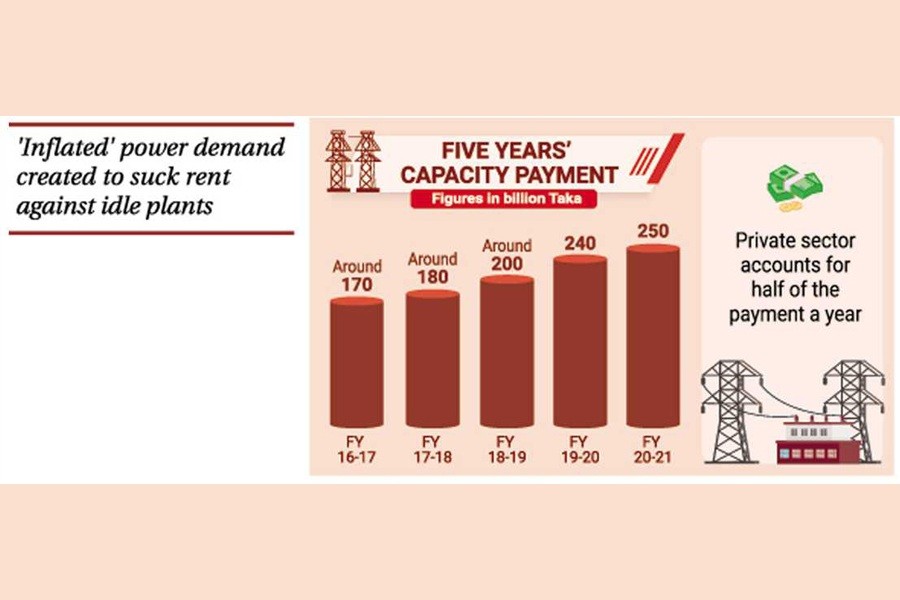Annual capacity payments to power-plant owners, sans use of electricity, keeps ballooning as the amount increased by around one-fourth to Tk 250 billion in the last fiscal year, according to the latest official count.
Officials say the payment obligation against unused capacities of the plants, including the much-talked-about expensive rental and quick-rental ones once hired to meet exigencies of outages, is mounting fiscal burden on the state-run Bangladesh Power Development Board (BPDB) -- and, hence, on the public exchequer.
As the fat bill for the FY 2020-21 came to their notice, some officials and energy experts drew the conclusion that it's time the government terminated deals with entrepreneurs of the excess power plants, preferably the hired oil-fired ones, because the actual power demand in Bangladesh is well below the installed aggregate capacity.
Country's operational power plant owners got around 25-per cent higher funds compared to previous FY's Tk 200 billion as incentives from the government against the unused capacity of their plants, a senior BPDB official told the FE Saturday.
The power board made the payments to power-plant owners under contractual obligation for keeping their plants idle.
Of the total capacity payments, the Payra 1320-megawatt coal-fired- plant owner alone charged around Tk 10 billion only for around seven months since its initiation of commercial operation until June 2021.
The country's largest operational power plant at the southern maritime port commenced its full-capacity operation early December 2020, behind around one year of the initial commissioning schedule.
"But it has been limiting its electricity generation to less than half of its capacity, generating around 600mw electricity only due to inadequate transmission line to evacuate electricity since commissioning," it has been alleged.
Addition of new power plants and non-retirement of several oil-fired power plants after their extended tenure also pushed up the capacity payments in the last fiscal compared to that of the previous year, said sources.
Currently, the country has a total of 146 power plants and the aggregate electricity generation was around 8,827 megawatts during day peak hours and 10,254mw during evening peak hours as on November 11, 2021 against the overall de-rated electricity-generation capacity of 20,934 megawatts, meaning more than half of the capacity was kept idle -- and paid for.
The BPDB is keeping around half of overall power plants idle and counting capacity charge for a lack of demand.
Capacity payment is a sort of penalty for BPDB that pays to plant owners if the government fails to buy a certain portion of power readily available with them.
As per power-purchase agreements, this penalty is calculated on the basis of around 40-per cent plant factor of the power plants, including the emergency-time oil-fired rental and quick-rental ones.
Energy experts and industry insiders deem it as the consequence of awarding 'more than required' expensive oil-fired power plants to the private sector.
The country, in a major policy shift, awarded dozens of oil-run rental and quick-rental power plants to overcome the then nagging electricity crisis in 2010.
Since then, the number of oil-fired power plants has increased, so has the amount of capacity payments.
Currently, the country has several dozen oil-fired power plants in operation.
Most of these plants were awarded based on unsolicited offers under the Speedy Supply of Power and Energy (Special Provision) Act 2010.
The law has a provision of immunity to those involved with such a quick fix in a desperate situation with power supply.
The government allowed private entrepreneurs duty-free import of furnace oil to run plants with a 9.0-per cent service charge along with import costs as an incentive, which has also been a mounting burden for the BPDB.
When contacted, energy adviser of the Consumers Association of Bangladesh (CAB) Prof M Shamsul Alam demanded immediate cancellation of agreements with the rental and quick-rental oil-fired power plants to check waste of state money.
The private-sector power-plant owners have already gained heavily against their investments as most of them got extension of their plants' tenures, he said to justify their stand on the quick rentals.
"We don't require too many power plants to count huge capacity payments every year," he added.
Energy expert Prof Mohammad Tamim accused a vested-interest group of projecting an inflated electricity demand for milking the cash cow.
"This has resulted in the installation of power plants having more than required demand and consequent counting of huge capacity payments," said Mr Tamim, also former special assistant to a caretaker government.


